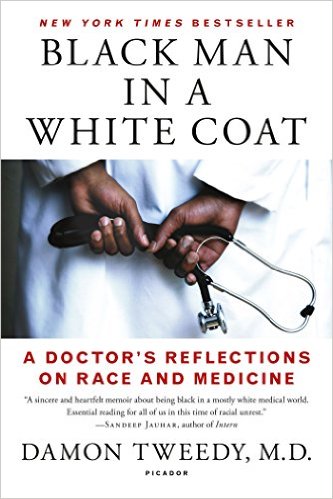Discussion Questions
Black Man in a White Coat: A Doctor’s Reflections on Race and Medicine
by Damon Tweedy
Publication Date: Sep 06, 2016
List Price: $15.04 (store prices may vary)
Format: Hardcover
Classification: Nonfiction
Page Count: 304
ISBN13: 9781250105042
Imprint: Picador
Publisher: Macmillan
Parent Company: Verlagsgruppe Georg von Holtzbrinck
Read More About This Book
- For the person(s) who chose (voted for) this book: What made you want to read it? What made you suggest it to the group for discussion? Did it live up to your expectations? Why or why not?
- What do you think motivated Tweedy to share his life story? How did you respond to his “voice”?
- What is Tweedy’s most admirable quality? Is this someone you would want to know?
- Compare this book to other memoirs/autobiographies that you/your group has read. Is it similar to any of them? Did you like Black Man in a White Coat more or less than other books you’ve read? What do you think will be your lasting impression of the book?
- Were you glad you read this book? Would you recommend it to a friend/ a younger person considering med school?
- What was the purpose of Did you like Black Man in a White Coat (eg. To teach, to entertain, to bring to light an issue)? If there was, did it make you/the group more aware and knowledgeable about the particular issue?
- If this book was intended to teach the reader something, did it succeed? Was something learned from reading Did you like Black Man in a White Coat, if so what? If not, why did the book fail as a teaching tool?
- Was there a specific passage (or incident) that left an impression, good or bad? Share the passage and its effect.
- The way a non-fiction book is written can impact a reader’s enjoyment and understanding of it. Was Did you like Black Man in a White Coat written in a way that was easily accessible?
- Was there something especially surprising about Tweedy’s story? What was it and why?
- Was there a lesson that could be taken away from Tweedy’s life? What was it and why is it important?
- Why do you think Tweedy organized Did you like Black Man in a White Coat the way he did (medical school years, internship and psychiatric training and clinical practice)?
- Have you had similar experience that Tweedy cited (being mistaken for the maintenance person [p. 12], responding to health issues with lifestyle changes [pp. 71 – 73], dealing with someone who initially did not want to deal with you because of race/gender [p. 192 – 202], receiving medical treatment [p. 147 – 150])?
- In terms of the issues raised – will they affect your life directly or more generally? Now or sometime in the future?
- What did you think of his analysis of the current situation for health care disparities (p. 236 – 237) – system based disparities that limit access to medical care (more interns than long term doctors); doctor-patient relationships/attitudes and behaviors; unhealthy lifestyles?
- Did you learn something new reading this book about a societal issue? About another culture/region of the country?
- Tweedy cites other memoirs/autobiographies (The Big Picture – Ben Carson (p.124), Brothers and Keepers – John Edgar Wideman [p.131], references The Other Wes Moore [p.132], Brain Surgeon – Keith Black [p. 25], Gifted Hands – Ben Carson’s first memoir [p. 25-6]). Are there other works that his story evokes?
- Tweedy is in his early 40s. It is not uncommon for follow-up memoirs/autobiographies to be written. Would you want to read a follow-up on the next chapter of his life?
- What did you like/dislike about the book that has not already been discussed/covered?
Tweedy’s was selected by Folktales Black Women’s Literary Society for their reading list.
